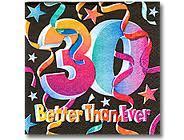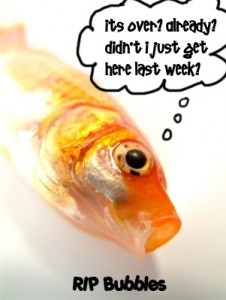Sara Paretsky's Blog, page 15
August 31, 2011
Finishing
Yesterday I finished making my final edits, responding to the publisher's final edits, on a new book (Breakdown, which will be in stores on January 3). This should be a time of euphoria, but endings are for me melancholy times. I typically go around in a kind of brain-dead fog for several weeks. This time I'm trying to short-circuit the fog by going out of town–my husband needs me to attend to some personal matters in his home town that he doesn't feel well enough to handle, and then I'll take a few days for hiking or whale watching or whatever is happening this time of year in the Pacific northwest. And come back incredibly buoyant. even exuberant, for my fall travel/lecture schedule.
August 23, 2011
Happy Birthday to V I
This coming January, V I Warshawski will turn thirty. It makes me gulp–a whole generation of readers and writers has matured since the brash Chicago PI first came on the scene in 1982.
I have plenty of time to brood about age and aging, but very little time to figure out how to celebrate this milestone.
There will be a new book in the series appearing on January 3, but there isn't time to add something onto it. I need ideas from you on how to celebrate. I will be creating souvenir pocket flashlights that everyone who pre-orders Breakdown will receive, but I want something festive to mark the occasion!
And I also need a slogan for the flashlights. 30 years of lighting the way is way too corny, not to mention tendentious and sententious. The person who comes up with the best slogan does get a free book.
Thanks to everyone around the world who's stuck with this stubborn, quirky, smart-mouthed lady.
July 14, 2011
Breakdown
Breakdown is the title of the new V I novel, which will be published early next year. In this excerpt, an old law school friend of V I's has called on the detective for help, and V I is trying to find her. V I describes Leydon like this:
Leydon Ashford was the first person I ever encountered who had two last names. We'd both grown up along the shores of Lake Michigan. The difference was, her family owned an eighteen-room mansion backing onto three hundred yards of private beach, whereas the Warshawskis' five-room bungalow was separated from the lake by a century of cyanide-laced landfill.
When I first met Leydon, in our Civil Procedures study group, I'd been prepared to despise her, along with her family, and the Austin-Healy Sprite her father gave her when she graduated from Wellesley. Leydon looked like a fairy-tale princess—she had hair like spun gold, and she seemed to float when she walked, like a feathery ballerina. I wasn't a ballerina, I was a street fighter, product of the mills and ethnic wars of Chicago's steel city.
12
Murder in the Cathedral
"Leydon? Leydon, if you're here, come out! It's me, Vic."
I was standing in the doorway to the old library at the Divinity School. The narrow mullioned windows were so clogged with ivy that even on a light summer evening, the room was too dark for me to see anything. I ran my hand along the walls, fumbling for a light-switch, but finally had to dig a small flashlight from my briefcase.
I shone it around the room, looking for the switches, or for some sign of Leydon. I kept calling her name, but when I finally managed to turn on the lights I didn't see any sign of her.
The old library had vanished, as well. The angels still soared overhead, which meant I was in the right room, but the library tables had disappeared along with the old biblical studies journals. I'd thought—hoped—I might find Leydon hiding in the stacks, but those were gone. The walls had been replastered and painted a bright white. It was like one of those movies where the villains drug the heroine and try to pretend that the strange house in the country where she wakes up is really her home.
In a corner of my mind, one I didn't like to visit, I could see Leydon as I'd found her twenty-five years ago: under her kitchen table, hugging herself, as she rocked back on her heels, weeping soundlessly. She'd been up for three days and I'd been looking for her—we were presenting a case together in Moot Court and I had tried to condense the hundreds of pages she'd spewed out into a document acceptable to the judges. I'd finally let myself into her apartment and found her.
I tried to think where she might have gone today. If she'd been calm enough to think, perhaps she would have gone to the coffee shop in the basement—our study sessions often started there. She might feel safe in the basement.
I stopped at the third-floor landing to call Leydon's name. I ducked down to look underneath the stairs, but didn't check the seminar rooms. At the second-floor, I shouted her name again. I was startled when a woman opened a door at the end of the hall and stuck her head out.
"You looking for someone?"
It couldn't be Leydon, my flickering first thought, unless she'd been transformed from a slender red-gold sylph to a heavy-set grey-haired earth goddess.
I apologized for disturbing her. "I thought the building was empty. I used to be a student here and I'm trying to hook up with an old friend."
The woman looked me up and down, deciding whether to trust me. "Is your friend on the nervous side?"
"The far side of nervous. Have you seen her? Slim, fair, a bit shorter than me. I'm V I Warshawski, by the way, if she asked for me by name."
"She was sitting on the stairs, sobbing. I thought maybe someone had died, but when I asked her it turned out she was crying over the reading room, the old library—she was horribly upset because we'd turned it into a conference room. You're not her case worker, are you?"
"Just an old friend," I repeated, depressed. "I'm going to see if she went to the coffee shop."
"It closes at four in the summer. You might check the chapels, Bond, or Rockefeller. She wanted to know where else on campus angels soared and I suggested those two places to her." She hesitated. "I did wonder if I should call campus security. I can still do it if you think—well, do you think she might be a danger to herself?"
I scrunched up my mouth—I didn't know what Leydon might do. "I haven't seen her for awhile, so I don't know how shaky she is these days. If I don't find her at either of the chapels, I'll call the cops myself."
I moved as fast as I could on my sore feet to Rockefeller Chapel, whose carillon tower dominates the neighborhood. The tower is almost twenty stories high and I wasn't sure they locked the stairwell.
I pulled open one of the heavy doors and entered into silence and twilight. I stood at the entrance to the nave, involuntarily hugging my arms across my chest: the stones seemed so cold, so ominous that I felt chilled, despite the heat outside.
The building is the size of a cathedral. The mullioned windows didn't let in much of the late-day sun, and the lamps hanging from the vaulted ceiling were so remote they might as well not have been switched on.
I strained my ears for any sound, a sob, a laugh, but heard nothing. "Leydon! Leydon?"
My voice bounced around the walls and gave me back a mocking echo. I started up the central aisle toward the chancel, my shoes setting up what sounded like a drumroll. Too big, too loud. If Leydon were in here she'd surely hear me, but if she were feeling abandoned, depressed, she might not be able to respond. I pulled the pencil flash from my bag, shining it under the pews as I searched.
I found her lying face-down near the chancel steps. Her red-gold hair glinted under my flashlight. I knelt next to her, smoothing it back from her forehead.
"Leydon, I'm sorry I was late. Was that too much for you to bear? Did you decide a nip or two of Jim Beam would carry you while you waited for me?"
I kept my voice soft, a loving croon despite the words. I'd learned long ago how cruel it was to add my criticism to the demons already attacking her.
June 30, 2011
Twice their Natural Size
I was at a dinner recently for an organization that does important work in the arena of climate change and energy policy. In the middle of a conversation I was having with the woman who edits their main publication, a man came over to interrupt; for the next twenty minutes, the editor and I suspended our conversation while he chatted wittily about his sailing experiences. (We did keep trying to return to the subject, an article I was trying to edit for her, but the strength of our lungs wasn't up to outblasting the sails.) At dinner, my neighbor–a different man– brought me up-to-date on his life history, including his different career moves, and the difficulty he'd had in finding dogwalkers when he first moved to Chicago.
Studies of women and men in conversation show over and over that women use about a third of conversational time; men two-thirds, whether in work or in social situations. Women who speak more than that are perceived as selfish, as conversation hogs, and the meeting or dinner party moves to isolate them. Films reflect this: women have not quite thirty percent of the speaking lines, and only one woman is usually allowed to speak in a scene, whereas many men may speak in the same scene. (why I like NCIS–Abby and Ziva both get to be on screen and speaking!)
At the dinner, I didn't want to violate my time limit, but I did think maybe I could have thirty percent of the speaking time, not zero. It did make me wonder what has changed in the last century, ever since Virginia Woolf wrote:
"Women have served all these centuries as looking glasses possessing the magic and delicious power of reflecting men at twice their natural sizes." Without that power, "probably the earth would still be swamp and jungle. The glories of all our wars would be unknown."
Woolf adds that Mussolini and other tyrants insisted on the inferiority of women because if we "were not inferior, we would cease to enlarge" men. Perhaps that is why it is so important to Justices Scalia, Roberts, Alito and Thomas that women be denied equal protection under the laws, but I must say, the dinner deepened my sense of depression over women's estate.
For another take on the subject, look at Facebook COO Sheryl Sandberg's recent commencement address to the women of Barnard.
June 7, 2011
I am Not V I Warshawski
People often ask me how much like V I Warshawki I am, and I have to say, not at all. This morning I went out early to Lake Michigan with my dog, Callie. She went in after a ball that was too big for her to pick up; she kept batting it with her nose and rapidly got rather far from shore. I called but she wouldn't abandon the ball. I took off my clothes and went in after but she was further than my swim ability in such cold water (about 60 F) and I went back to shore hoping she might follow. At 400 yards out she was too small for me to see her other than as a little blob on the water. I was filled with despair but went back in up to my neck and stood calling "come" over and over and by some miracle she finally turned and swam to shore.
I was quite useless in the situation. I'm sure V I would have picked up a lifeguard rowboat and rowed out to rescue Mitch & Peppy, but me–I was physically feeble and emotionally distraught. The only good thing is–I still have my dog.
And she, whole-hearted retriever that she is, wanted to turn around and go back to find the ball.
May 29, 2011
Flash Fiction at Printers Row
Come one, come all. Test your storytelling against the world, or at least against other writers.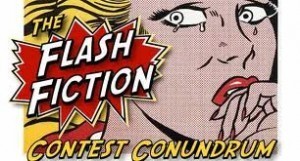
Printers Row, Chicago's literary festival, is taking place June 4-5, on Dearborn Street south of Congress. New books, used books, writers reading, readers writing–it's all there! We Mystery Writers always have a tent, and this year on June 4, from four to five p.m., we're having a Flash Fiction contest.
Write a story that you can read in 5 minutes. Choose one of the following opening sentences:
1) He wasn't going to make it.
2) It was the smell that got to her.
3) Digging a hole six-feet deep was harder than he thought.
4) He'd have done it different if he'd known how much weight she'd gained.
5) They say a goldfish will eat anything.
Take it from there to anywhere. Barb D'Amato and I will be judging. Points will be awarded for everything from suspense to humor to coherence, and prizes will be awarded with a lavish hand. The only goal is to have fun!
May 1, 2011
Edgar Photos
I went to New York last week for the Edgar banquet, where the Mystery Writers of America did me the honor of naming me a Grand Master. It felt strange to join Dorothy Salisbury Davis, Rex Stout and Agatha Christie's company, as if I were both old enough and distinguished enough for the honor. In my previous post, I included the remarks I gave on accepting this honor, but I also wanted to post a few pictures. I'm afraid I'm in most of the pix because I was getting people to take pictures of me with friends, but I hope some more wide ranging pictures will show up soon that I can add here.
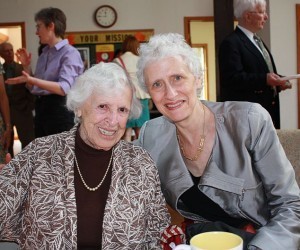
With Dorothy Salisbury Davis for her 95th Birthday
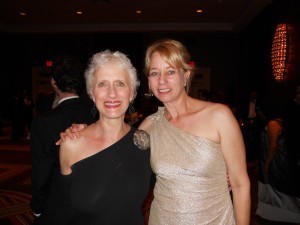
With Laura Lippman at the Edgars
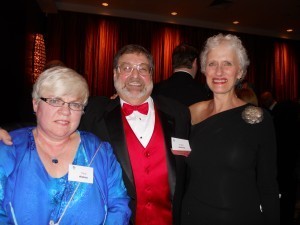
Augie Aleksy and Tracy won the Raven for their stellar bookstore, Centuries and Sleuths
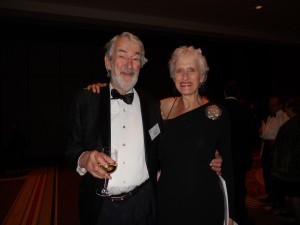
My husband, Courtenay Wright, still fits into the dinner dress he bought in 1949
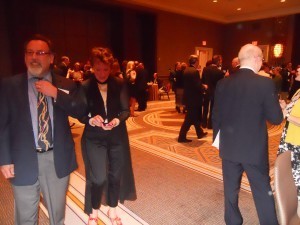
Writer and editor Joanna Krotz, one of my oldest friends, arrives with Putnam publicity director Michael Barson
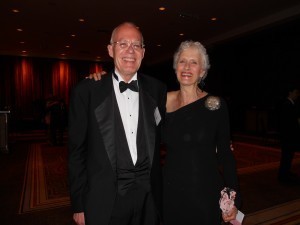
With my literary agent, Dominick Abel
April 30, 2011
Edgar Grand Master-Remarks
The text of my acceptance speech for the MWA Grand Master Award is here–I'll publish some photos from that magical exciting evening in a little bit.
I went to my first Edgar dinner in 1982. I watched the icons of my reading life talking and joking, but I was painfully shy and didn't try to introduce myself to anyone. I was seated at a table at the outermost reach of the Sheraton ballroom, and the highpoint of the meal was when a waiter slugged one of my tablemates for not relinquishing his salad plate on schedule.
I'm amazed, and grateful, to join the company of Grand Masters whose work I have long admired, but it is unsettling to realize how quickly 29 years have passed.
Many people helped me reach this point. Stuart Kaminsky, whom we mourn, mentored me as I wrote my first book. My agent, Dominick Abel, agreed to represent me all those years ago; he has never faltered in his support.
Thanks to my editor, Chris Pepe, and my publishers, Putnam, for their hard work, and their presence at the banquet. (Although the company is known as GP Putnam's Sons, it was George Putnam's daughter Mary who was a leading 19th century writer and feminist. It seems fitting that my novels bear the name of the woman who forced England to accept women as doctors.)
I have been fortunate in the friendship of Dorothy Salisbury Davis. Her advice as a writer, and her guidance in the business of living, have been my lodestar for many years.
Above all, I thank my husband, the distinguished physicist Courtenay Wright, who has listened to 29 years of fears and self-doubts; his steadfast support has kept the wind beneath my sails. To him and to Dorothy, this award and these remarks are equally dedicated.
The world of books has seen major changes since my first Edgar dinner. It had been hard for me to find a publisher for a woman PI in America's heartland; now, as a result of the revolution I helped start, detectives of all stripes and locations are commonplace.
I was lucky: in 1982, there were many more publishers to approach than exist today.
We live in a world of conglomerated publishers and distributors; we writers are often told that we are not creating stories or characters, but brands, as if the chief difference between our stories and toilet paper is that you can't upload Charmin to your iPad. At least, not yet. In such a world it is hard to remember that we are storytellers, not accountants, marketers or vending machines.
This is not a new problem. When Melville published Moby Dick in 1851, the reception by both public and critics was hostile: he had left his brand, his travelogue novels. During Melville's life, this astonishing masterpiece sold 500 copies. In a bitter weariness, Melville wrote Hawthorne:
The silent grass-growing mood in which a [person] ought to compose – that can seldom be mine. Dollars damn me.
Melville lived through times as turbulent as ours—slavery, the Civil War, the changes wrought by industrialization. But ours is also a time that thrives on slick one-liners, and on lies, made easier to swallow because we devalue literacy.
Today, close to one in four American adults can't read or write well enough to handle a job application, let alone read a novel.
It took a 12th-grade vocabulary for Melville to follow the Lincoln-Douglas debates, but our most recent presidential debates use the language of sixth graders. Some candidates have devolved to the pre-school level.
We writers owe a duty to our gifts. We've been given the gift of language, and we need to dig deep into words. We need to relish wordplay, not rely on clichés as we stumble toward the marketplace, or settle for the slick, repackaged street-talk we pick up from rap and TV.
And we owe a duty to our other gift, our stories. In the cacophony of sound that fills our broadband waves, amid the lies and shrill self-promotions, it is essential that we writers return to Melville's silent grass-growing place and find the truths that fiction can lay bare.
Our fictions are myths, of course, not histories: they show heroes vanquishing monsters. Theseus versus the wicked Minotaur, Marlowe versus the wicked temptress, V I Warshawski versus the wicked corporation, they're all the same story.
But these fictions tell essential truths, about our emotional lives, what we fear, what we want, what we need. Writing is a form of auto-surgery: the closer we cut to our own bones, force ourselves to emotional truth, the more authentic will our voices become.
As the poet Sappho wrote, more than 2600 years ago,
Although they are only breath
Words, which I command
Are immortal.
What we remember from Sappho's time, and from Melville's, are not brand-names nor spreadsheets, but poets. For in the end, it is that word which is only breath which endures.
April 10, 2011
To F*CK, or Not
I just came from seeing Black Watch, a play about the famed Scottish regiment put on by the National Theatre of Scotland. The play is about the deployment of the regiment to the so-called Triangle of Death during the early years of the endless war in Iraq. It's about why young men join armies, about the history of the Black Watch regiment, and about what it's like to serve in a war where the opponent's main weapons are suicide bombers and IED's. Much of it was thought-provoking, and it was certainly well-acted.
My caveat was with the dialogue, which lacked shades of color, both in volume–almost all was shouted–and in content. The dialogue was probably meant to mimic barracks dialogue, but most sentences were so heavily laden with "fuck" and "cunt" that the tone of the piece became monochromatic.
I was wondering on the way home about writing dialogue. My own view is that authentic recorded speech may not get you to the heart of your characters. To show the inner mind of a teenage boy who is choosing between being a miner or a soldier (a choice the play presents) requires more subtle language than "fucking cunt fucking came to the fucking bar". That may be what the boy says, but it doesn't show us what he thinks.

Black Watch on duty in Iraq
What do you think? Do you convey emotion with literally recorded speech? Can you convey authentic character with imagined speech?
April 1, 2011
Home is the Sailor
I'm just back from a great trip overseas, touring in the UK for Body Work. I did a few posts on Facebook along the way but I'll try to share a few highpoints here.
Dogs. Knowing how much I missed my Golden, Kerry Hood from Hodder brought Maddy into central London one morning so that I could have some dog time in Hyde Park.
Also in Hyde Park is a large human-made pond, the Serpentine, filled with all manner of water birds. People come down to feed the birds, and dogs frolic nearby in the shrubs and lawns round-about.
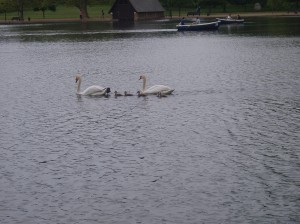
Swans on the Serpentine, Hyde Park
Maddy circled the pond without a lead. She eyed the bread put out for the ducks but on Kerry's command abandoned it, and never once tried to jump into the Serpentine. I realized that if Callie and I lived in London, we would spend all our time in Magistrate's Courts, paying fines for jumping in among the birds.
Other dogs: a working dog in Glasgow that stood up and took applause any time Denise Mina or I roused a laugh. An old man walking along the river in Carlisle, with his dog frolicking around him. I followed as long as I could, thinking the scene looked straight out of the opening of Mill on the Floss. A lost dog in Toulouse, trembling with fear because it couldn't see its mistress. I handed her over to the park maintenance crew, who found her address screwed into a cylinder around her neck and promised to take her home.
Events Natasha Cooper helped me launch Body Work at Waterstones Piccadilly and Denise Mina did the same favor at the Mitchell Library in Glasgow. Both women were as interesting and generous in person as they are in print and the audiences responded warmly to the warmth they could feel on the stage.

Reading Room at the Mitchell Library, Glasgow
Two sisters in their eighties attended the Glasgow event. During the Q & A, one commented that the acknowledgements in my books are so long she couldn't understand why mine is the only name on the jacket cover. However, she stood in line, very erect despite a cane, and bought a book for her baby sister's 80th birthday.
From there we went to Peebles for the Borders book festival, where Alistair Moffat did a Q & A. On his first trip to Chicago, Mr. Moffat was put into Cook County Jail overnight until his wife posted $500 cash for a fender-bender. Myself, I think they were shaken down–I never heard of anyone being locked up in County for a fender-bender. Even so, he generously likes Chicago. And he was the most skilled interviewer I've encountered since the late great Studs.
The weather couldn't have been more glorious for the whole trip. Flowers bloomed, grass was green, trees were in leaf. It was a terrible shock to return to Chicago, where it's all still brown and cold. In fact, when we landed and the pilot announced that the local temperature was 26 F I wanted to curl up in my seat while the cleaners prepped the plane and return to London. But I climbed off, and now, after going through a 2 1/2 week pile up of mail, dust and laundry, will return obediently to work.

